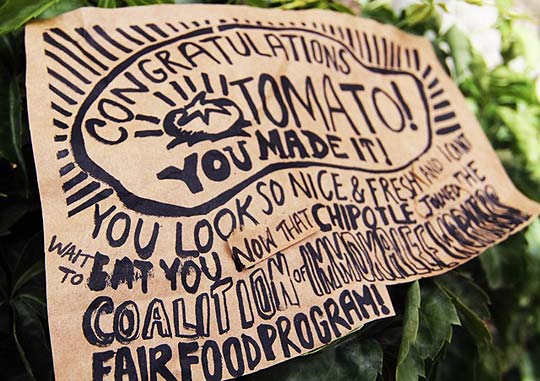
Plus: What’s it all mean for the Fair Food Program and the Good Food Movement?
Despite the late hour of yesterday’s news out of Denver, coverage of the Chipotle agreement is flying fast and furious. In the interest of keeping up with the flow, here below are links to some of the early returns:
- “Chipotle signs fair food agreement with the Coalition of Immokalee Workers,” examiner.com
- “Mexican food chain latest to join Fair Food Program,” Ft. Myers News-Press
- “Food Justice Victory: Chipotle Signs Agreement With Coalition of Immokalee Workers,” Common Dreams
- “Farmworker coalition signs Chipotle to higher-wage agreement for tomato pickers,” Naples Daily News
- “Chipotle signs agreement to improve conditions for workers,” Denver Post
Most of the initial coverage stuck mainly to the fact that an agreement was reached, without getting into an analysis of the significance of the agreement for the food movement or farm labor justice more broadly. One exception was the examiner.com, which opened its coverage by placing yesterday’s events this broader context:
| “In the fight for fair labor practices in the U.S. food industry, grass-roots organizing by conscientious consumers has been taking an increasing role. A case in point is today, when Chipotle Mexican Grill signed an agreement with the Coalition of Immokalee Workers (CIW) to become the 11th large food retailer to join the coalition’s Fair Food Program.For decades, farm laborers in Florida have harvested tomatoes and other fresh produce for stagnant, sub-poverty wages, under harsh working conditions. The CIW’s advocacy begins at the top of the food supply chain, with consumers who demand that large food retailers source their produce only from growers who pay fair wages and treat their workers in accordance with national and international human rights standards…” read more |
The full significance of the Chipotle agreement is still to unfold, but a few things can be safely said even at this early juncture.
First, the Fair Food Program — which combines a code of conduct (forged over several years in a unique collaboration among workers, buyers, growers, and consumers) with an oversight program that monitors and enforces the code through worker-to-worker education, a protected complaint investigation and resolution process, regular farm office and field audits, and market consequences for failure to comply — is already the most comprehensive, verifiable, and sustainable program for social responsibility in US agriculture today.
Adding Chipotle’s full support and partnership to that mix, given its leadership in so many other fields of sustainable agriculture, will only make the Fair Food Program, and the Florida tomato industry as a whole, stronger.
Second, it is no secret that the sustainable food movement in this country has had something of a blind spot when it comes to farm labor. Way back in 2008, Eric Schlosser penned an article for The Nation on the first Slow Food gathering in San Francisco. Entitled “Slow Food for Thought,” Schlosser’s piece found the movement to be falling well short of its own goals, as expressed by the Slow Food movement’s charismatic founder Carlo Petrini, when it comes to labor and human rights:
| “At the heart of Petrini’s Slow Food philosophy is a set of fundamental values that aim to distance its celebration of pleasure from mindless decadence. According to the Slow Food trinity, food must be ‘good, clean, and fair.’ The ‘good’ refers to taste; the ‘clean,’ to local, organic, sustainable means of production; and ‘fair,’ to a system committed to social justice…… The first Slow Food Nation partly fulfilled (this) broad agenda. It earned high marks for the good and the clean but next time could do a hell of a lot better with the fair. At the moment, the majority of Americans–ordinary working people, the poor, people of color–do not have a seat at this table. The movement for sustainable agriculture has to reckon with the simple fact that it will never be sustainable without these people.” read more |
Again, given its position in the sustainable food world, there can be little doubt that Chipotle’s embrace of the Fair Food Program’s core principles will help move the entire food movement in the right direction on workers and human rights.
Finally, for those supermarket companies and restaurant chains that are still desperately trying to avoid joining the Fair Food Program — from Publix, Kroger and their kin in the grocery industry to restaurant stragglers like Wendys and the Florida-based Darden Restaurants — Chipotle’s decision to partner with the CIW and Florida tomato growers in the Fair Food Program sends a powerful message. As the examiner.com article says at the top of its story:
| “In the fight for fair labor practices in the U.S. food industry, grass-roots organizing by conscientious consumers has been taking an increasing role.” read more |
The 21st century supermarket or restaurant company no longer has the luxury of distancing itself from the sins of its supply chain. The connection between those often gross inequities and consumers is nearly instant in this age of communication, and the channels feeding that connection are growing every day.
In the case of the Florida tomato industry and the remarkably encouraging changes already underway due to the Fair Food Program, it is not so much the sins of their suppliers that will tarnish the supermarkets and restaurant companies that refuse to participate. Rather, it will be their own sin of refusing to support the groundbreaking progress spearheaded by the Fair Food Program that will, with every passing day, haunt them as the rest of the food industry — along with many of their better informed customers — slowly, but surely, passes them by.
